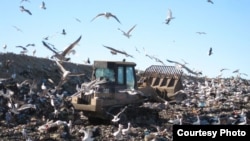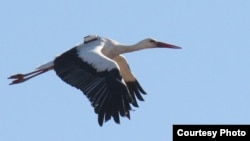Storks in southern Europe have become junk food junkies.
Thousands have given up their winter migratory habits to feast on trash in landfills as resident birds. When the dump trucks arrive, storks swoop in for a feast of rotten fish, rancid chicken, and leftover hamburger and pizza.
The putrid smell does not bother the storks, who nest nearby and raise their young.
These same birds once spent the winter in sub-Saharan Africa, says conservation ecologist Aldina Franco. Her team at the University of East Anglia in England equipped 48 birds with GPS devices to track their positions five times a day. Each tracker also collected accelerometer information with detailed data about the birds' behavior.
Writing for the journal Movement Ecology, Franco says migrating patterns began to change about 30 years ago.
"We started seeing some individuals [storks] remaining in Europe the whole year," Franco said.
The researchers wanted to find the biological mechanism that triggered the change.
Stay-at-home storks
That number gradually started increasing, then rose exponentially in recent decades, according to a study.
"Fourteen thousand are now wintering in Portugal," Franco said, "a tenfold increase in 20 years."
Franco says storks are opportunistic, adapting to changes in the environment — including a warmer climate.
"The climate becomes milder, so the winters are milder. Therefore there will be more grasshoppers, more invertebrates available on natural habitats," she said. "We're also seeing an invasive crayfish and more wasted food in the landfill."
All these resources have boosted the stork population.
Storks tracked over decades
Storks can live 25 years or more, which gives the researchers time to study migration patterns within the birds' lifetime.
Those habits may change again, as rubbish dump sites in Portugal are scheduled to be gradually replaced with compost factories in coming years, Franco says.
"Will the storks remain, the ones that are resident, will they remain in Iberia [Spain and Portugal] and eventually starve? Or will they completely switch strategy and go and feed on natural habitats because food is no more abundant due to global warming? Or will they become migrants again?"
Franco hopes to answer those questions in future studies.
The stork is among a growing number of migratory species that have changed their behavior due to human influences and global environmental change.














